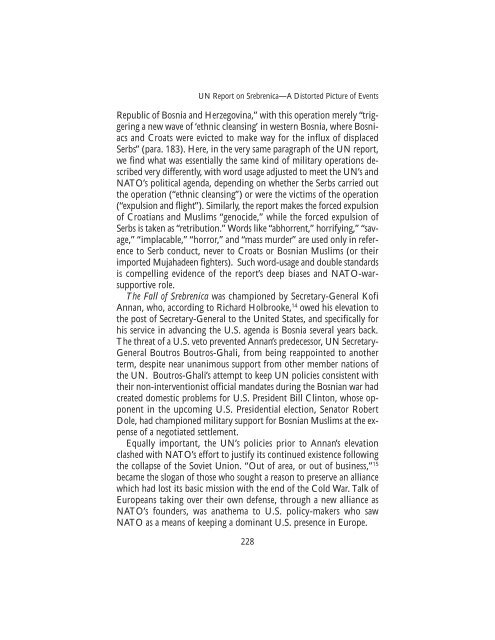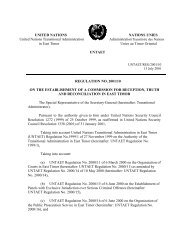The Srebrenica Massacre - Nova Srpska Politicka Misao
The Srebrenica Massacre - Nova Srpska Politicka Misao
The Srebrenica Massacre - Nova Srpska Politicka Misao
You also want an ePaper? Increase the reach of your titles
YUMPU automatically turns print PDFs into web optimized ePapers that Google loves.
UN Report on <strong>Srebrenica</strong>—A Distorted Picture of Events<br />
Republic of Bosnia and Herzegovina,” with this operation merely “triggering<br />
a new wave of ‘ethnic cleansing’ in western Bosnia, where Bosniacs<br />
and Croats were evicted to make way for the influx of displaced<br />
Serbs” (para. 183). Here, in the very same paragraph of the UN report,<br />
we find what was essentially the same kind of military operations described<br />
very differently, with word usage adjusted to meet the UN’s and<br />
NATO’s political agenda, depending on whether the Serbs carried out<br />
the operation (“ethnic cleansing”) or were the victims of the operation<br />
(“expulsion and flight”). Similarly, the report makes the forced expulsion<br />
of Croatians and Muslims “genocide,” while the forced expulsion of<br />
Serbs is taken as “retribution.” Words like “abhorrent,” horrifying,” “savage,”<br />
“implacable,” “horror,” and “mass murder” are used only in reference<br />
to Serb conduct, never to Croats or Bosnian Muslims (or their<br />
imported Mujahadeen fighters). Such word-usage and double standards<br />
is compelling evidence of the report’s deep biases and NATO-warsupportive<br />
role.<br />
<strong>The</strong> Fall of <strong>Srebrenica</strong> was championed by Secretary-General Kofi<br />
Annan, who, according to Richard Holbrooke, 14 owed his elevation to<br />
the post of Secretary-General to the United States, and specifically for<br />
his service in advancing the U.S. agenda is Bosnia several years back.<br />
<strong>The</strong> threat of a U.S. veto prevented Annan’s predecessor, UN Secretary-<br />
General Boutros Boutros-Ghali, from being reappointed to another<br />
term, despite near unanimous support from other member nations of<br />
the UN. Boutros-Ghali’s attempt to keep UN policies consistent with<br />
their non-interventionist official mandates during the Bosnian war had<br />
created domestic problems for U.S. President Bill Clinton, whose opponent<br />
in the upcoming U.S. Presidential election, Senator Robert<br />
Dole, had championed military support for Bosnian Muslims at the expense<br />
of a negotiated settlement.<br />
Equally important, the UN’s policies prior to Annan’s elevation<br />
clashed with NATO’s effort to justify its continued existence following<br />
the collapse of the Soviet Union. “Out of area, or out of business,” 15<br />
became the slogan of those who sought a reason to preserve an alliance<br />
which had lost its basic mission with the end of the Cold War. Talk of<br />
Europeans taking over their own defense, through a new alliance as<br />
NATO’s founders, was anathema to U.S. policy-makers who saw<br />
NATO as a means of keeping a dominant U.S. presence in Europe.<br />
228



